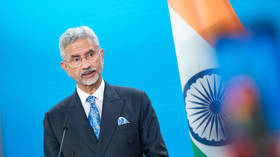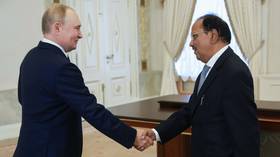India has no Ukraine conflict peace plan – foreign minister

India doesn’t have a “peace plan” to resolve the Ukraine conflict but it does engage in dialogue with both Moscow and Kiev, the country’s foreign minister stated on Tuesday, during an event at the Asia Society in New York.
The country’s Prime Minister Narendra Modi has met with Russian and Ukrainian leaders several times in recent months. He met President Vladimir Putin in July in Moscow, the first state visit of his third term in office. He has also met with the Ukrainian leader on at least three occasions since June, both on the sidelines of US-hosted global gatherings and in Kiev.
In response to a question about India’s growing role in the peacemaking process, Minister of Foreign Affairs S. Jaishankar clarified that, while India has not proposed specific strategies or conditions to end the conflict, it is actively engaging with both parties.
“It is not that we have a peace plan. We are not suggesting anything–we are having these conversations and sharing them with the other side. My sense is that both sides appreciate it,” he said.
“If these conversations are helpful, there are not many countries and leaders today that can engage with both Putin and Zelensky; I think we could make a contribution,” the minister added.
In Modi’s discussions with Russian and Ukrainian counterparts, he emphasized that diplomacy is the only way to resolve the conflict and that there is no solution “on the battlefield.” On Tuesday in New York, Jaishankar reiterated New Delhi’s position, adding that “at some point, there has to be negotiations, and it obviously has to include both parties; it cannot be one-sided.”
Jaishankar was also asked about India’s relationship with Russia, which has evolved since the outbreak of hostilities in Ukraine and in spite of Western pressure on New Delhi to sever ties with Moscow.
“We didn’t have anything other than a positive experience with the erstwhile Soviet Union and then Russia,” Jaishankar observed, explaining the historical and geostrategic roots of his country’s robust ties with Moscow. “During the Cold War, when the US and Western countries generally tended to prefer dictatorships like Pakistan, we had a 40-year period where the West primarily armed Pakistan and we turned to the USSR as a military partner. We have a long defense and security relationship with Russia.”
The top diplomat also emphasized that Russia currently supports India’s economy, as the nation of 1.4 billion people depends on imported energy resources to sustain and expand its growth.
New Delhi has become one of Moscow’s biggest trade partners after Russian business turned to Asian countries following the imposition of sweeping Western sanctions over the Ukraine conflict. In 2023, their trade turnover registered over $65 billion, compared to average figures of $10-13 billion reported annually before 2022. Putin and Modi set a goal of $100 billion in mutual trade by 2030 at their meeting in Moscow.













